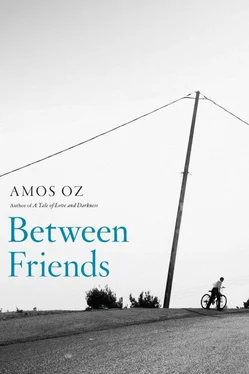Martin Vandenberg’s room was furnished with spartan simplicity: a bed, a table, a large curtain-covered crate to hang his clothes in, and another elongated crate on iron legs that served as a bookcase. It was filled with books in six languages on philosophy and academic research, four or five novels in German, Dutch, and Esperanto, several volumes of poetry, a number of dictionaries, and a Bible with illustrations by Gustave Doré. Hanging on the wall was a picture of Ludwig Lazarus Zamenhof, the creator of Esperanto, the language that everyone on all five continents would speak someday so that the barriers between individuals and peoples would be brought down and the world could return to the way it was before the curse of the Tower of Babel.
Osnat helped Martin to his bed and stroked his forehead gently. She left a small lamp burning at his bedside and switched off the ceiling light. Martin didn’t sleep lying down, but sitting up, his head and shoulders supported by large pillows to ease his breathing. Every night, he’d sit that way on his bed waiting for sleep, which, if it came, was brief and fragmented. Osnat placed the oxygen mask over his nose and mouth, the gray stubble on Martin’s sunken cheeks jutting out from under it. She smoothed his blanket and asked if he needed anything else. From behind his mask Martin said, “No. Thank you. You’re an angel.”
Then he took off the mask and said, “Man is by nature good and generous. It’s only the injustices of society that push him into the arms of selfishness and cruelty.” Then added, “We must all become as innocent as children again.”
From where she stood at the door, Osnat replied, “Children are spoiled, cruel, selfish creatures. Just as we are.”
However, since neither of them had children, and because they didn’t want to end their evening with an argument, neither one added anything further to their disagreement but simply said good night. After she’d gone, the small lamp next to Martin’s bed continued to burn. He pulled a pack of cigarettes out from under his pillows and, taking advantage of Osnat’s departure, smoked half a cigarette, crushed the butt in an ashtray, wheezed a little, then put the oxygen mask back over his face, his breathing rapid and shallow. Leaning against the pillows, he read a book by a well-known Italian anarchist who maintained that authority and obedience to that authority are contrary to man’s nature. Then he dozed off in his semi-upright position, the transparent mask covering the bottom half of his face, the light still on. It remained burning next to his bed till morning, even though Martin believed that waste is exploitation and frugality a moral imperative. But the dark terrified him.
Osnat took the tray with her when she left, though most of the food was still on it. She put it down on the porch steps to take back to the kibbutz kitchen early the next morning on her way to work in the laundry. Then she went for a short walk along the cypress-lined avenue, which was illuminated by the garden lights. Ever since Boaz had left her to go and live with Ariella Barash, Osnat had become especially attentive to everything around her, to the words of passersby and the sounds of birds and dogs. As she walked, she thought she heard Martin choking and calling for her to come back, but she realized that it was only her imagination, because even if he were calling her, she wouldn’t have been able to hear him from that distance.
Sitting alone on a bench in the middle of the avenue of cypress trees was Grandma Slava, wearing a loose cotton dress and open sandals that showed her coarse, crooked, red toes. A widow and bereaved mother, she was feared by one and all on the kibbutz — they called her a witch and a monster because she was always telling people off and had been known to spit in the face of anyone who made her angry. Osnat said good evening and Grandma Slava asked her in a mocking, bitter tone, “So what exactly is it that makes this hot and humid evening so good?”
Back in her apartment, Osnat poured herself a glass of cold water with lemon syrup and took off her sandals. She stood barefoot at the open window and said to herself that most people seem to need more warmth and affection than others are capable of giving, and none of the kibbutz committees will ever be able to cover that deficit between supply and demand. The kibbutz, she thought, makes small changes in the social order but man’s difficult nature doesn’t change. A committee vote will never be able to eradicate envy, pettiness, or greed.
She washed her glass and placed it upside down on the drying rack, undressed, and went to bed. Only a thin wall separated her bed from Martin’s, and she knew that if he coughed or wheezed at night, she’d wake up immediately, throw on her robe, and hurry next door to help him. She was a very light sleeper; her ears registered every bark of a dog in the darkness, every shriek of a night bird, every sigh of wind in the thick bushes. But the night passed quietly, with only the sound of the night winds blowing through the ficus trees. Toward dawn, heavy dew fell on the lawns and the moonlight poured over everything, illuminating the glistening, pale silver dewdrops.
The pigeons woke Osnat before six, as usual, and she showered, dressed, knocked on Martin’s door to see how he was, picked up yesterday’s tray, and went to work in the laundry. Martin got out of bed and dressed slowly, panting from the effort as he bent to put on his shoes. After drinking some water, he set out for the shoe repair shop, pushing his small oxygen tank in the old stroller the Health Committee had allocated to him. He walked slowly, dragging his feet, because he found it hard to breathe, especially going uphill. Near the electrician’s workshop he met Nahum Asherov, the electrician, and the two men spoke for a while about politics and Ben Gurion’s government. Nahum said that the government was provoking the whole world with its retaliatory raids, and Martin replied that all governments, without exception, were completely unnecessary and our government was doubly unnecessary because the Jews had already shown the world how a people can exist and even thrive spiritually and socially for thousands of years without any government at all. As he spoke, Martin lit half a cigarette, but didn’t inhale more than twice because he began to choke. He put it out and returned the butt to his pocket. Nahum Asherov said, “Don’t smoke, Martin. You shouldn’t smoke.”
“We shouldn’t tell others what they should or shouldn’t do,” Martin replied. “We were all born free, but we shackle each other with our very own hands.”
“We have to look out for each other,” Nahum said, with a sigh.
A smile crossed Martin’s sunken lips. “So be it, Nahum. You definitely have to tell me not to smoke and I definitely have to smoke. Each of us does what he’s meant to do. So be it.”
In the shoe repair shed, sitting on a wicker stool and surrounded by the pungent odors of leather, polish, and glue, Martin placed the oxygen tank on a crate beside him and pulled the mask over his face. Then, holding a cobbler’s sharp knife in his fist, he cut out a precise left sole along the line he had drawn in pencil earlier on a sheet of leather. A small bottle of lukewarm water stood on the floor in front of him, and every now and then he lowered the mask slightly and took two or three sips. Work, he said to himself, returns us to the simplicity and purity of our early childhood. An old Spanish melody, the anthem of the Republican soldiers from the days of the Spanish Civil War, came to his mind and Martin hummed it softly.
A little after eight in the morning, Yoav Carni, the kibbutz secretary, came in and said, “I’m here to bother you for a few minutes. We need to talk.”
Martin said, “Sit down, young man.” Then he moved the oxygen tank from the crate to the floor at his feet and added, “There aren’t too many places to sit here. Sit on the crate.”
Читать дальше












